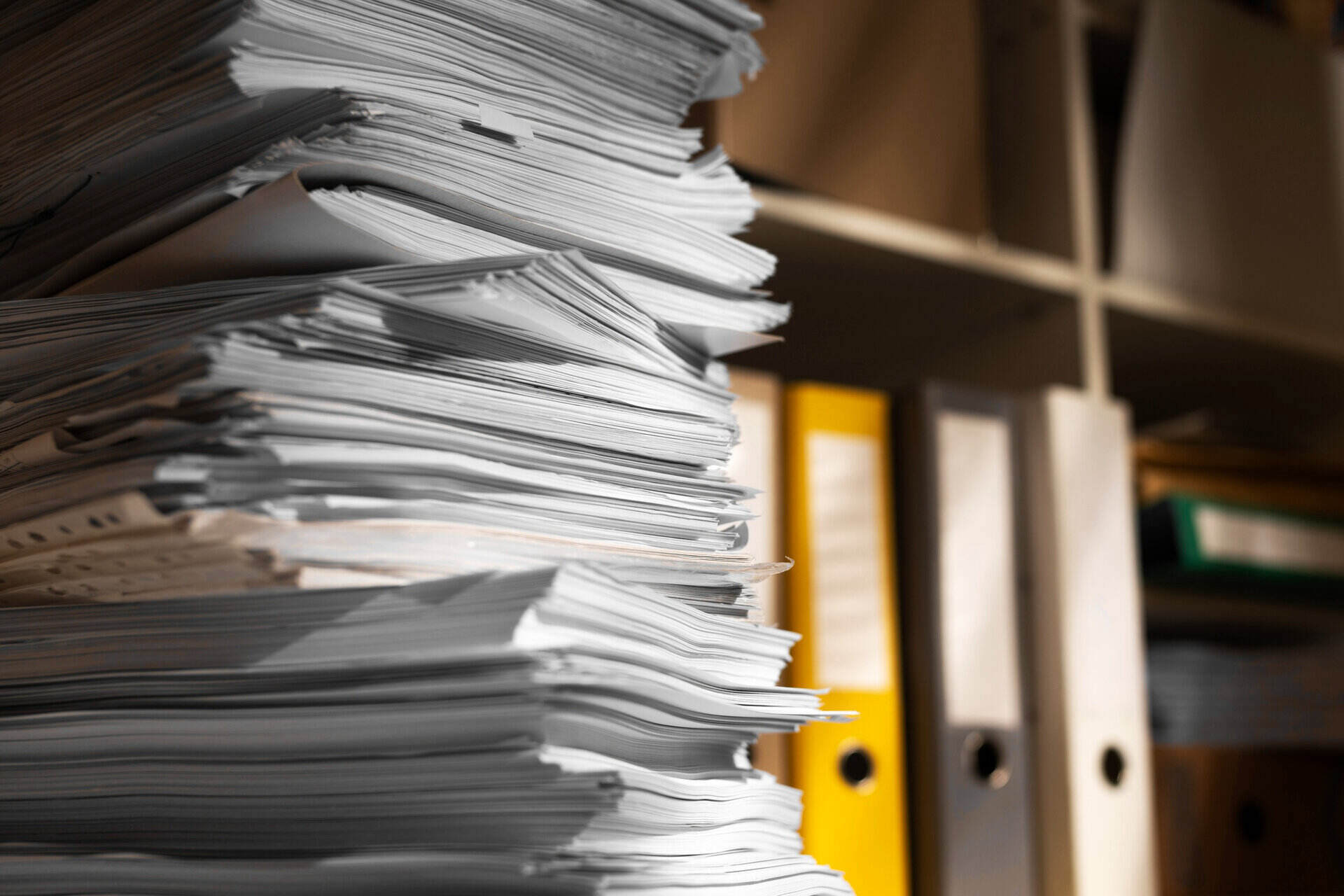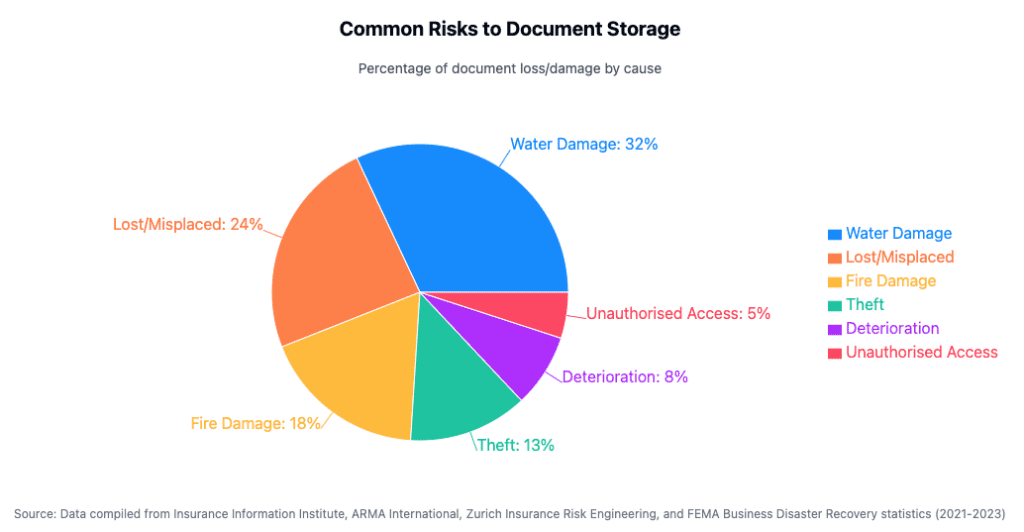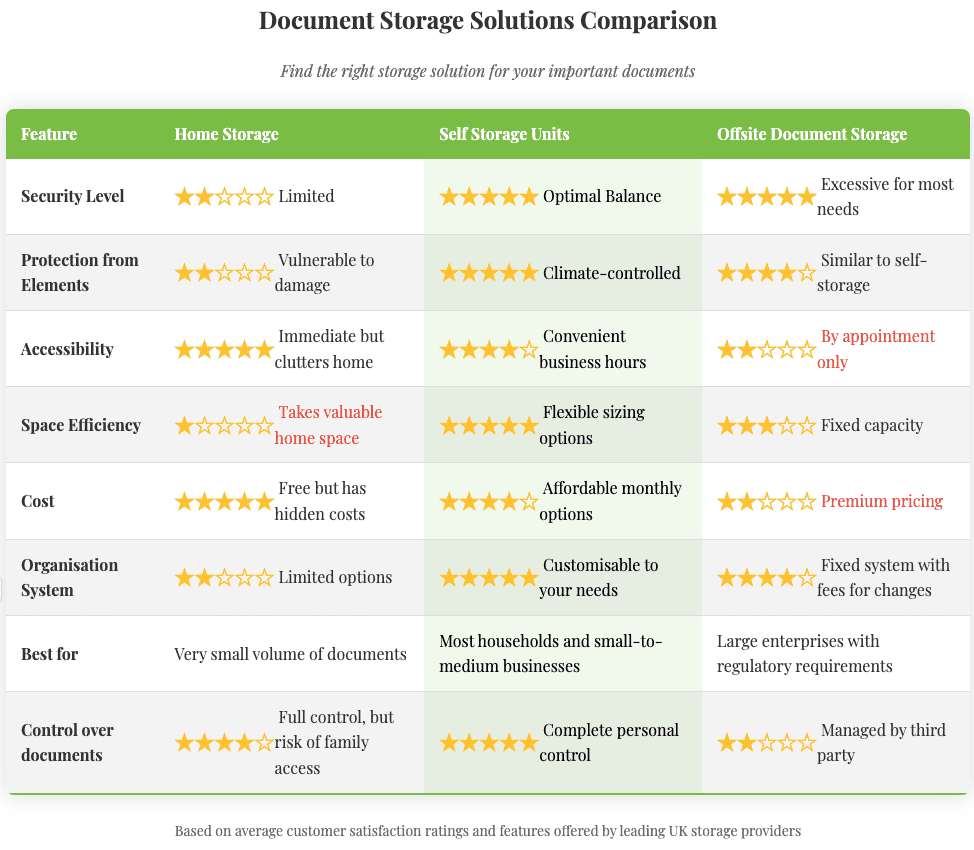In today’s fast-paced and increasingly digital world, it is easy to overlook the importance of properly storing physical documents. However, sectors such as legal, finance, medical and government regularly rely on secure document storage solutions, not to mention individuals who need to safeguard personal records. UK regulations specify clear retention periods: HMRC requires tax records and bank statements to be kept for 6 years, NHS Digital recommends medical records be retained for 8 years, and documents like birth certificates and property deeds should be stored permanently.
Recent industry data reveals alarming statistics: water damage accounts for 32% of all document-related insurance claims, with lost or misplaced documents following at 24%. Fire damage (18%), theft (13%), deterioration (8%), and unauthorised access (5%) round out the major risks facing physical document storage. Ensuring these documents are stored securely and remain accessible when needed is essential. In this guide, we explore the best practices for safe document storage, including how self-storage and offsite document storage can help protect your most valuable papers.
Organise documents before storing
Before considering storage options, take the time to sort and categorise your documents. Create clear classifications for financial records, personal identification documents, legal papers, and any other important files. This not only helps reduce clutter but also makes it easier to retrieve documents when required. Use clearly labelled folders or filing systems to keep everything in order.
With 24% of document problems stemming from items being lost or misplaced, a consistent organisational system is not just convenient—it’s essential for preserving your important information.
UK Document Retention Guidelines
Understanding how long to keep various documents is crucial for proper organisation. Here are the official UK retention periods:
Document Type | Retention Period | Authority |
Tax Records | 6 years | HMRC |
VAT Records | 6 years | HMRC |
Bank Statements | 6 years | HMRC & FCA |
Property Deeds | Permanent | Land Registry |
Contracts & Agreements | 6 years | Limitation Act 1980 |
Birth Certificates | Permanent | General Register Office |
Medical Records | 8 years | NHS Digital |
Insurance Policies | 6 years | FCA & ABI |
These retention periods should guide your document organisation strategy, ensuring you keep important records for the legally required timeframes.
Choose the right storage method
There are several options available for storing important documents. Many individuals keep documents at home, but this can pose significant risks. Given that water damage is the leading cause of document loss at 32% of claims, home storage without proper protection can be particularly vulnerable, especially in basements or areas prone to moisture.
A safer alternative is to use a secure self-storage facility. Self-storage units provide a dedicated space away from your home or office, offering a more secure environment that typically includes climate control and enhanced security measures to protect against the top risks identified by insurance companies.
For businesses managing large volumes of paperwork, offsite document storage is often the most efficient solution. Offsite facilities are designed to store archived materials systematically, allowing for quick retrieval while freeing up valuable office space.
Protect documents from physical damage
To prevent the most common causes of document loss, store documents in sturdy, waterproof containers or filing cabinets. With water damage accounting for nearly a third of all document-related insurance claims, this precaution alone can significantly reduce your risk exposure.
Avoid storing papers in basements, lofts, or garages, where they may be exposed to damp or fluctuating temperatures. Ensure each document is handled with care and kept flat to avoid creasing or tearing.
Using acid-free folders and sleeves can also extend the life of important records and prevent deterioration, which accounts for 8% of document damage claims. For added protection, consider digital backups by scanning important documents and saving them securely in the cloud or on encrypted devices.
Maintain security and access control
Security should be a top priority when storing sensitive documents. Theft (13%) and unauthorised access (5%) represent significant risks that can be mitigated with proper security measures. Self-storage and offsite document storage facilities often provide enhanced security measures such as CCTV and individual unit locks.
Only authorised personnel should have access to your stored records, and a clear log of who has retrieved which documents can help maintain accountability and reduce the risk of misplacement, which accounts for nearly a quarter of all document problems.
Conduct regular audits of your records
Even after documents are stored, it is important to periodically review and update your archive. Remove outdated or unnecessary paperwork, and ensure that all vital documents remain intact and accessible. A regular audit schedule will help you stay on top of your record-keeping responsibilities and significantly reduce the 24% risk of documents becoming lost or misplaced.
Why choose Alexanders for document storage
At Alexanders, we understand the importance of secure, reliable storage for your personal and professional documents. Whether you need short-term self-storage or long-term offsite document storage, our facilities offer a trusted solution tailored to your needs.
Our expert team is on hand to help you organise and manage your document storage with ease. Protect your records today by calling Alexanders on 0333 800 2323.

Updated Daily








